Master Books Curriculum
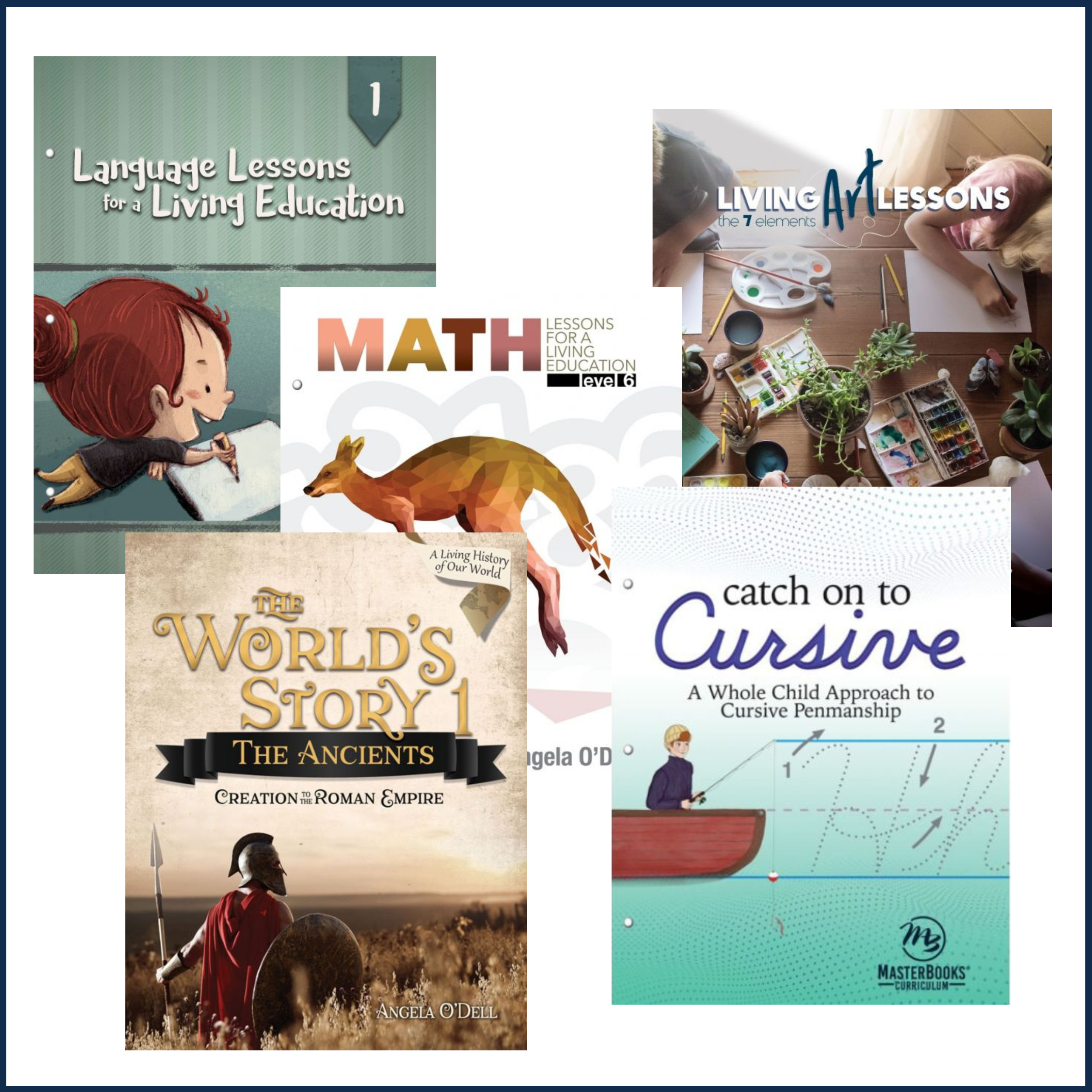
Workbooks in Homeschooling: A Misunderstood Resource? Our CEB team has met a fair amount of homeschoolers who recoil a little at the thought of using workbooks in their homeschool. We get it—who wants to replicate the schools with their repetitive worksheets when we have this once-in-a-lifetime opportunity to give our children a rich, engaging, and living education? But what if workbooks are exactly what you need? What if we told you that workbooks could be the exact tool you’re looking for to help you provide an engaging education for your children? Introducing Master Books They are a workbook-based curriculum that should not be overlooked as you plan your homeschool year. What makes Master Books special? Their workbooks are: graded colourful Christian open and go cover a variety of subjects But are they rigorous? They are not highly academic, but they cover the basics. Some might even say they are, well, mediocre—meaning, “of moderate academic quality.” But doesn’t life sometimes call for mediocrity? We’ve all experienced seasons where mediocre meals, housework, or family time is the only option. Don’t be ashamed! We’ve all been there—or will be there. Is this a test of endurance… or contentment? Ask yourself this question when you find yourself in “that season”: Is the Lord testing you on how fast you can recover and get back to healthy eating, tip-top housework, and the most memorable family time? Consider that maybe it’s your contentment that’s being challenged. How are you responding? What’s your attitude when life doesn’t allow for “the best”? Who Are These Resources For? This resource is going to appeal to families who: need something simple as they transition from a school setting to a homeschool setting, especially families who are not ready to abandon a typical way of doing school are expecting a new baby, experiencing illness, traveling, or tackling a big move and need a resource that can be used fairly independently have a child who needs to just “get through” some language arts (or other subject) so they can indulge in delight-driven learning are accountable to authorities and need some quick box checking want to be assured they are covering the basics but want room in their week to: have extensive and enriching family-centred morning times, read through booklists, go on field trips, dive down educational bunny trails, and pursue passion projects Read number 5 again! Did you notice it? Yes, workbooks can actually give you peace of mind and freedom to pursue all the other amazing educational opportunities that are afforded to homeschool families. Do What Works for You You need something that will work for YOUR family, in YOUR situation. Maybe this year it’s Master Books. By Adrianne Curwen Adrianne is a wife to a public-school educator/administrator and a homeschooling Mama to seven children, ranging in age from 8 to 24. In 2021, the family added a son-in-law to the bunch. She believes that we have a unique opportunity as homeschoolers to design individualized education that suits giftings, interests, and passions. She and her husband have used a blend of registered homeschooling, enrolment with independent DL schools, and participation in public trade school programs to design individualized programs for their children. She is passionate about using as many read-alouds, picture books, novels, and conversations to educate her children but also gets excited by the amazing homeschool-designed curriculum that’s out there. Adrianne is thrilled by her new role as Creative Director and is grateful to have an opportunity to learn something new. She is grateful, every day, for her saviour, Jesus Christ, and has no greater joy than when she sees her most important mission field walk with Him.
Quick Tips for New Homeschoolers

Getting Started: Tips for New Homeschoolers Making the decision to homeschool is often the most difficult part of the entire process. Once you’re in, you’ll want to set a firm foundation with these highly recommended books. It can be challenging to see beyond the traditional school model, but these books will help you cast a vision and give you the courage you need. If you are a beginner in the homeschooling journey, below are some quick but effective tips for new homeschoolers. Teaching from Rest Awaking Wonder For The Children’s Sake Homeschool Community New homeschool families often wonder who will make up their community. You might need to do some research, ask around, or maybe just go and hang out at a local educational attraction during school hours. Also, consider bringing grandparents into your support system. If they are unsure about their new role as a grandparent of homeschoolers, let them know about this blog post. Want more tips for new homeschoolers? Continue reading. Deschooling Deschooling, also called unschooling, is simply a process of untangling beliefs about education and decompressing from the pressure of traditional school. The best way to do that is through field trips, library visits, conversations, nature walks/study, reading aloud to your children, and doing school work while in your pajamas. New homeschooling families need time to evaluate their beliefs about education, discover how their children learn best, and even how their child’s day should look. Deschooling includes coming together and learning as a family, discovering your child’s interests, and embracing a new lifestyle. Take weeks or even months to move through this stage. Once you are ready to introduce the curriculum, Beautiful Feet Books has incredible resources that are perfect for that delicate stage of transitioning from a traditional school mindset to a homeschooling one. Ease Into Homeschooling Some families prefer to ease into homeschooling by using a traditional workbook approach. Master Books resources are ideal for new homeschool families who are feeling wobbly about completely abandoning the structure and set-up of traditional schools. The workbooks are straightforward, easy to use, and cover a variety of subjects and grade levels. Still Overwhelmed? Start with books and specifically reading aloud! Yes, even to your readers. This is actually one of our favorite tips for new homeschoolers. Reading aloud is a relationship builder. Check out our free read-aloud booklist and get started right away. We also have a free read-aloud planner. Need more convincing and help getting started with read-aloud? Grab any of these books and you’ll be well on your way. Give Your Child the World Honey for a Child’s Heart The Read-Aloud Family Jim Trelease’s Read-Aloud Handbook Need a one-on-one consultation? Contact the office and book a Curriculum Consultation with Hester. Phone: 604-505-2194 or Email
It Won’t All Stick

As I’ve entered my 10th year homeschooling this Fall, I wanted to send some encouragement your way to those of you who are just starting out, or who have only been homeschooling for a short while. Homeschooling families often experience wells of internal pressure, wondering, “how will we complete all of this?” The pressure can also be external as well-meaning family and friends express concern over learning gaps (and socialization). This pressure can positively wreck a new homeschooling family’s peace of mind and drift their course off path if sharp enough. I need to let you know that of all the sticky notes of information that we put before our children during their homeschool years only some will stick and crinkle with age, most won’t remain on the mirror. Homeschooling quickly becomes a lifestyle, and you begin to think less and less of ‘school-lessons’ and instead, just ‘life’ as the years press on. Diligence in academics (over recalling facts), consistency in character-building, perseverance in physical training, fellowship with peers and family, extracurricular experiences, and a growing faith in God create a solid and holistic soul. Consider examples from my family. I have students who are flustered by a lot of math yet push through the discomfort to do about 10-15 minutes per day, even in the summer. It is this diligent character that I want to stick. Stories stick and so it is the moral lessons that are built upon living books that will stand the test of time. It is the routine and habit of moving our bodies along with the seasons (lake swimming, hiking, etc.) that will reach into their adulthood and make a difference. And the community that is built with regular church attendance and the faith that is built as we face challenges and are witness to God’s love, care, correction, and goodness that we want to see still sticking as time goes on. Swap out a few activities and your family is just like mine. Perhaps you have not considered yourself to be nurturing a whole person because these things don’t tick off provincial learning outcomes. The majority of your homeschooling role is to bolster the person and celebrate the sum of the whole, not just complete the small academic portion of each individual. Even during difficult seasons where one may feel that schooling falls by the wayside, there is still forward motion. The human brain is curious and driven to keep learning and parents hold the rudder, guiding our young children on what to learn. But they will inevitably be the ones to keep the boat going. And whether a lackadaisical summer-day row, a fever-pitch race, or a leak in the boat, every bit is momentum towards who they will become. We have a grand privilege to watch every part of it and God uses it all including our persistent work and love. The sticky notes that stick? Those are the glimpses of the people they are becoming. The student may forget the dates of past wars, or might not remember how to solve quadratic equations, but does any of this matter in the formation of a human being who is developing to reflect God’s glory? Also, those sticky notes that stick contains their gifts, talents, and aspirations; they will remain and likely blossom into something beautiful over time. Feed and nurture those! As you look back, the crinkly and aged yellow paper that is still on the mirror were previews to who they are becoming. We will never get to all the read-alouds, or every science lab, but we can reorient our expectations to provide security and love to the growing immortal soul in front of us. “How can it be a large career to tell other people’s children about the Rule of Three, and a small career to tell one’s own children about the universe? G.K. Chesterton ____________________________________________________________________ My name is Sarah Mast and I homeschool my two kids in Ft. Langley, BC. One of my favorite aspects of homeschooling is the community gained, and I volunteer with a local support group to help foster that and connect others. My family loves the outdoors and traveling, and our weekends include skiing, swimming, hiking, or biking depending on the season. I found Classical Education Books at a conference and noticed their well-curated selection of children’s books. I kept tabs on their collection of the classics and hard-to-find books and reached out. Now I get to help customers hone their collections, and work on the ever-growing inventory here at CEB!
My Adult Children are Homeschooling My Grandchildren – Now What?

Welcome and Happy Grandparents Day (September 12th) to all the grandparents of homeschoolers. You have an opportunity to be a treasured resource to your adult children and their children. Keep reading to find out how. Almost 20 years ago, I was listening to a radio broadcast on Christian radio and heard the host describe a list of things that were statistically known to help children walk well along their Christian journey. One of the items on that list was “having an adult, other than parents, who spurred them on in the faith”. I encourage you to be that person. And if you are the grandparent of a homeschooler, you have an extra special opportunity. Understand the Benefits The homeschool community is growing but still contains only a fraction of school-aged children in Canada. Many parents waffle a bit as they entertain the idea of homeschooling, and it can be a challenge for grandparents too; I encourage you to get on board early. Here is a list of benefits that might help you understand why your children have decided to take this on. There is more time to bond as a family Children are not immersed in competing worldviews day in and day out Families are less reliant on the government There is more time available to spend with grandparents Increased opportunity for one-on-one instruction More time to pursue interests Freedom to avoid the hurried pace of the typical school experience Children can more easily work at their own pace If you are still struggling with the idea of your children homeschooling your grandchildren, consider being supportive despite your reservations. Over time you will witness the benefits and may even become an advocate. The Nuts and Bolts If you’ve decided to jump in and support your children and grandchildren there are a few key things that would be helpful for you to know. Each province and territory in Canada has a different set of homeschooling regulations. Find out what they are in your area. Some homeschool families remain connected to the public school system while others are able or choose to be independent. For families connected to the public system, there are often checklists to complete throughout the school year; maybe there is something that you can take on. Here is a starter list of common homeschool terms for you to research classical education charlotte mason education unschooling and deschooling traditional homeschooling eclectic homeschooling outdoor/forest/wild schooling read-alouds copywork, dictation and narration living books and twaddle unit studies Support Once you are armed with basic information, you are ready to find out where you can fit in. You have talents, passions, interests, and wisdom to pass on to your grandchildren. Talk about it with the parents to see how you might be able to serve, but be sure to figure out what will work for them; maybe it will be once a week, maybe it will be once a month. I know an involved homeschooling grandma who is planning to teach German to her grands, but the subject matter does not have to be academic in nature. You can pass on your gardening skills, mechanical giftedness, start a book club or a weekly bible study. There is no shortage of ways to serve a busy family even if you are not interested in teaching. Take the time to figure out what might be a good fit for you. My Mum has been a huge blessing to us over the years. Once a week she came to help with laundry, make dinner, play games, and visit with the children. Those days often became my appointment and errand days, and I was regularly able to take time for phone calls and visits with friends. What I’ve described so far might seem like too big of a commitment for you or maybe your family is just too overwhelmed, at the moment, to figure out how to include you. Honestly, the smallest gesture can be so helpful. In an attempt to feed my family healthy food, I often found snack time challenging. Making homemade muffins, or dropping off a fruit or veggie plate might be just the thing to help your family. If you have the means, consider helping financially. When a family decides to homeschool, they take on a significant financial commitment, often living on one income and having to purchase all the needed curriculum, lessons, books, and supplies. Offer to pay for a set of swimming lessons, buy the art supplies, or fund a book-a-month club. Try to Avoid A key benefit to homeschooling is the opportunity to develop an individualized education that is tailor-made for each student. Therefore, it is counterproductive to compare one grandchild to another, either within a family or between families. It is completely acceptable to have students who start reading at age 4 and in grade 4. Avoid using spot quizzes to gauge how well this homeschool thing is working out. Instead, look at the relationships, and the developing character, faith, and love. Socialization is not something you need to worry about unless your grandchildren never leave the house. If they are going to the grocery store, getting together with other families for walks, hosting visitors in their home, and visiting you, they are learning how to socialize. Instead of being offended by your adult child’s decision to do something differently from you, take it as a compliment; you have raised a brave, courageous, independent, and responsible adult. Final Thoughts Your adult children are pulling a wagon and it contains the vision they have for their family and it’s a heavy load because they have a host of forces that are trying to pull that wagon in other directions. They need you to come alongside and help pull that wagon. Take the time to discover what their vision is and then, even despite not understanding all the parts of the vision, pitch in. Note to Parents If your children have a grandparent that helps pull your family wagon
Do Mornings Well part 2

Everyone needs to define for themselves what a successful homeschool morning includes and in my experience, the definition can vary with each season of life. I had a different standard during my night-time nursing years than I do now with a seven-year-old as my youngest. As you are pondering what a successful morning looks like, consider what others do, try what might work for you, and leave the rest. We don’t run a rigorous homeschool, but I like to be productive and can get discouraged when the hours float away with little to show for it. I am on a constant quest to improve our mornings and am a firm believer in the idea that winning the morning is key to winning the day; those days become weeks and months before you know it. In part one, I wrote about Homeschool Morning Time/Morning Baskets as part of a successful morning; you can read about that here. Habits help your mornings. Another key ingredient that I aim to include in our mornings is good habits. If we were to all sit-down and share our visions for a successful morning, none of us would include spending 20 minutes looking for the grammar textbook before starting the grammar lesson! Instead, we should be building in ourselves and our children some foundational habits of orderliness. Good habits are important, and your morning habits set you up for the rest of day; poor morning habits have a way of reaching into your evening, and poor evening habits reach into the next morning (morning girl hates late-night girl). Values and Habits You need to decide for yourself what habits are important to you. Start by thinking about what you value and go from there to build habits in yourself and your children. We don’t all value the same things, in the same order of priority and that’s ok. There are many categories of habits: health & wellness habits, spending & financial habits, social & relationship habits, cleanliness & orderliness habits, productivity habits…the list goes on. It really is worth sitting down, thinking things through, and coming up with a plan to incorporate the habits that align with your values. What works for me, might not work for you. I’m someone who values orderliness and so in my world, washing the breakfast dishes right before having to make lunch is a madness maker but really there is no law that says breakfast dishes must be washed immediately after breakfast. I believe what’s important is that you have a plan and live with a quiet confidence in your plan. Those breakfast dishes need to get done and if washing them at noon fits better into your day then go with that. What I think is hard to live with on a day-to-day basis is to arrive in the kitchen at noon and realize, “Oh right, I haven’t done the breakfast dishes yet”. The morning is key! As you work through the process of identifying your values and then deciding on what habits need to be worked on, focus on morning habits for now. There is no need to tackle an entire days’ worth of habits or every single beneficial health and wellness habit all at once. Instead, focus on what you want your mornings to be like and evolve from there. Training your Children Your children are building habits whether you guide them in this or not and they will be habits that will serve them well in the future or compound the challenges of life. Training the habits of children is challenging and sometimes slow going. If we were enjoying a cup of tea together, I would encourage you to start young but with a long view in mind; avoid too much too soon as small changes over time make a big difference. Begin with a few foundational habits that are important to you, master them and then add more; be gentle but consistent, and inspect what you expect. Classical Education Books carries a stack of resources to help you with your habit training. Laying Down the Rails Teaching Character Through Literature Manner of the Week Wall Chart Healthy Happy Habits Good Manners for Kids Myself & Others Mind Your Manners New Americal Cursive – manners by Adrianne Curwen Adrianne is a wife to a public-school educator/administrator and a homeschooling Mama to seven children, ranging in age from 7 to 23. She believes that we have a unique opportunity as homeschoolers to design individualized education that suits giftings, interests, and passions. She and her husband have used a blend of registered homeschooling, enrolment with independent DL schools, and participation in public trade school programs to design individualized programs for their children. She is passionate about using as many read-alouds, picture books, novels, and conversations to educate her children but also gets excited by the amazing homeschool-designed curriculum that’s out there. Adrianne is thrilled by her new role as Communication Specialist for Classical Education Books and is grateful to have an opportunity to learn something new. She is grateful, every day, for her saviour, Jesus Christ, and has no greater joy than when she sees her most important missions field walk with Him.
The Story of Science: Aristotle Leads the Way (Review)

Homeschool Science: The Story of Science: Aristotle Leads the Way Aristotle Leads the Way was the main science text I found to pair with Beautiful Feet Books Ancient History (Intermediate) curriculum for my past year of homeschooling. My kids were in grades 6 and 8 this past year, and we often do Socials and Science together for ease. Aristotle Leads the Way was a perfect fit for middle school. I wanted an open-and-go resource that we would be able to keep up with our interwoven subjects. I was so pleased with this choice! It created a rich and fertile ground for seeping ourselves into history I’d forgotten from my youth but was eager to press into.* Teach Science through History Finding Aristotle Leads the Way was like finding a needle in a haystack. I was able to marry two sciences that my children enjoy learning about–Physics and Astronomy–with the historical era of Ancient Egypt, Greece, and Rome. If your child has never been introduced to either of these subjects, it doesn’t matter. This is an excellent place to start because Hakim gives us the chronological order of the ideas and observations that birthed these two subjects. If your students have had experience they’ll find new information and rediscover the why and how behind these disciplines from great thinkers of ancient times. As far as textbooks go, this is a smaller one, but at just under 300 pages, it’s flush with ancient maps, geographical photographs to provide context, works of art throughout antiquity, diagrams of inventions, and little excerpts that give the student practice with the concepts, whether that’s prime numbers or how Hero calculated the area of a triangle. Don’t know who Hero was? You’ll want to look him up; he was one of my students’ favorite thinkers and tinkerers from this text. If Hero’s ideas would have caught on quicker we’d likely be in flying cars by now! He invented hydraulics and a steam-powered device while living in Alexandria. The steam-engine powered train was up and running only 18 centuries later. Hero was a tad ahead of his time. I learned a lot this past year alongside my kids, and Hakim was a fantastic tour guide. She has a witty sense of humor, and the book is written to be read as a story. She spins the known world and highlights the masters of antiquity in philosophy, astronomy, physics, engineering, and mathematics, and how all of these disciplines were entwined together in the beginnings of scientific thought, experimentation, and record. We had such a good experience with Aristotle Leads the Way that we’ll be finishing the series over the next two years, adding Newton at the Center and Einstein Adds a Dimension, to our curriculum choices for science. I don’t recall ever hearing a peer saying to another, “Wow, that was really good!” about a textbook but that happened in my classroom! *So many puns, so little time. My name is Sarah Mast and I homeschool my two kids in Ft. Langley, BC. One of my favorite aspects of homeschooling is the community gained, and I volunteer with a local support group to help foster that and connect others. My family loves the outdoors and traveling, and our weekends include skiing, swimming, hiking, or biking depending on the season. I found Classical Education Books at a conference and noticed their well-curated selection of children’s books. I kept tabs on their collection of the classics and hard-to-find books and reached out. Now I get to help customers hone their collections, and work on the ever-growing inventory here at CEB!
Do Mornings Well! Part 1

Do Mornings Well! “Win the Morning, Win the Day!” I see this quoted often in books, on blogs, Instagram feeds, and Facebook pages that are dedicated to productivity, entrepreneurship, personal growth, and habit development. I’m not an entrepreneur, but I’m a bit of a productivity/habit/organization nerd, and over the last several months, I’ve been wondering how some of the excellent advice that is given in the business space might apply to homeschooling. One of the key concepts that I come across on a regular basis is the idea of setting yourself up to win your mornings. In the business world that often means being up at 5 am, getting in a good workout, answering emails, reviewing the day’s schedule of meetings, and planning out a list of tasks. Winning the morning is a concept that can be applied to anyone’s life and I’ve got three topics that I’d like to share with you over the next several months that will help you win your homeschool mornings. Morning Time Building Habits Bullet Journaling Morning Time: Mornings with my children have always been a treasured time. So much so that it was a challenging adjustment as my children grew and started to be out of the home most mornings with work and post-secondary classes. The memories of first morning smiles from my babies, first hugs of the day from my toddlers, and big kids who always seemed to be in the mood to snuggle first thing in the morning are some of my favourite mothering moments. Our homeschool mornings have always been gentle and slow-moving, but productive. The nighttime nursing years rarely saw me out of bed before the little ones, but now, with my nursing years behind me, I’m able to get out of bed before my children and accomplish a few things before waking them up to get started with their day. I encourage you not to miss the opportunity we have to make special morning memories. It’s worth seeking out how to do them well. And winning the morning sets you up for a great day. I first heard about morning time at a homeschool conference (also called morning baskets, lunchtime learning, together time, morning meeting, family learning time, and circle time). The concept is simply gathering your children together to learn something together and it is a great way to start the day. We have tried implementing this concept at other times of the day, and you should do what works for you, but I think there are real benefits to sticking to mornings. Morning Time starts your day with order and routine, ensures that enrichment studies get done, and my favorite…if the rest of our day falls apart, we have still engaged in meaningful learning. Getting Started with Morning Time You don’t need heaps of time. Start by setting aside 20-30 minutes and build up from there. I like to use several resources each morning, but you can start with one, and add on as you go. If you are already doing a regular morning devotion, add one more component to your Morning Time to get you started. Storage for Morning Time Resources When I first heard about Morning Time, it was referred to as a Morning Basket and I opted to use an actual basket. We outgrew that basket quickly so I currently use a 3-tiered rolling cart, but you could use a bookshelf or box. Portable storage is ideal if you think you might want to do morning time curled up on your bed one day and at the kitchen table the next. Scheduling your Homeschool Morning Time Once you have built up a stack of resources you will want to consider scheduling. My preference is a flexible loop schedule. I set things up so that I can move a resource that I’ve used one day to the back of the stack to wait for another day. The only one I use daily is the bible resource. You could opt for a set schedule too, where you have particular resources that are used on certain days. I prefer to keep things flexible. I make morning time a priority but there are times where I have to set it aside or we have to cut our time short so looping through the resources seems to work best for us. Ages & Stages and Morning Time Resources I’m currently spending my mornings with my four youngest (ages 7-15). I have found that when we have used a resource that is geared towards younger children, the older ones have found the review helpful; when the resource is geared towards older ones, the younger ones still seem to be able to glean bits of information that build over time. I would encourage you not to fret over the age for which a particular resource is intended. The bible resource we are currently reading is designed more for my 10-year-old but I know that it is a helpful review for my 12 & 15-year-old and my 7-year-old is making connections to the resource we used last year that was geared towards his age. Key Components of Your Morning Time Devotions. Reading a chapter-a-day from the bible works well or you can opt for a Bible storybook. At times we’ve added bible memory work. And when we attended a large church, we had a special prayer project where we rotated through praying for our missionaries (a practical geography lesson too). I would highly recommend any of these resources; we’ve used many of them. The Ology and Wonderfull are next on our list after we are finished with The Children’s Illustrated Bible. Other Bible Storybook Resources Include: The Big Picture Story Bible The Children’s Illustrated Bible The Child’s Story Bible The Story Bible The Golden Children’s Bible Jesus Storybook Bible Story Bible for Older Children The 100 Most Important Events in Christian History When you’re ready, add a creative component: drawing, picture studies, poetry, a simple seasonal craft, and music
Summer Music – Tips & Resources

As a music teacher, I always approach the summer months with a sense of apprehension. The majority of families take a well-deserved break through July and August, and I wave goodbye to my students at the end of June wondering how much knowledge they’ll return with in September. “Use it or lose it,” is an interesting truism, and I have seen the results of this in many kick-off lessons. So if you’re looking for summer music ideas and activities, read on. If you want your kids to use the skills they’ve carefully and patiently built up over the last ten months over their summer break, or if you want to bolster your fine arts repertoire, or if you simply want to expose a curious child to music education to see if they might be interested in music lessons come the new school year, then this summer music blog post is for you! Summer Music Tips & Resources Five easy tips to keep the love of creating music alive in your kids during their summer break. Listen Listening to Classical music is an easily missed component of learning music. Students can get so caught up in perfecting their pieces that they forget the bigger picture of what they are a part of. Go through their music books and find the composers that they’re playing (names are usually in the top right corner on the page), then take to Youtube and Spotify and find out what else they’ve written. Bonus points if you can find videos of professional performers and symphony orchestras to expose your kids to good posture, performance practice, and stage presence. Books like Meet the Orchestra (for smaller children) and The Story of the Orchestra (for somewhat bigger children) also do a fabulous job of introducing kids to the different instruments used in Western Art Music and can be especially beneficial if your child only has experience with one instrument. The Gift of Music is another fabulous tool if you want to study a particular composer in depth. Research Using books like The Story of the Orchestra (for middle children) and The Gift of Music (for older children), take the composers you’ve found and listen to their pieces with some background knowledge of the composer. Did you know that Beethoven was already going deaf as he wrote his infamous Fifth symphony? Did you know that Schumann was likely schizophrenic? Did you know that Bach had twenty children? Did you know that much of Mendelssohn’s music was likely written by his sister, Fanny? This sort of background knowledge can inform how you and your children listen to and appreciate the music, and will also benefit them as they go on to play music by these composers. Colour Colouring is a remarkably efficient and flexible way to engage children of all ages in music appreciation. Using colouring books like the Musical Instruments colouring book, the Great Composers colouring book, and the Music Activity Book gives your children a double whammy experience, combining both creative work and studious work. Simply giving them a piece of blank paper and telling them to draw a story that they think the music sounds like is another simple and quick way to get them to listen and use their imagination. Program music (instrumental music that was written to purposefully depict a story) is a great place to start. Saint-Saens’ Carnival of the Animals, Tchaikovsky’s Peter and the Wolf, Grieg’s In the Hall of the Mountain King, and Vivaldi’s Four Seasons are great pieces that come with stories already. If you think your child is ready for something more abstract, go for pieces like Beethoven’s 5th symphony, Handel’s Water Music Suite, or Schoenberg’s Piano Suite. Expand Take the opportunity in the summer to expand your child’s (and your own!) taste in music beyond whatever is on the radio or on your playlists already. Listen to Harry Connick Jr. if your child has never been exposed to jazz. Find a family-friendly musical like Newsies and memorize all the lyrics. Discover different styles of folk and fiddle music like Bluegrass, Irish, Old-Time, and Metis. Or go farther abroad and listen to music from Europe, the Middle East, Asia, and Australia. You’ll find instruments not found in the resources above, and your kids will develop an ear for a wide variety of styles! Create While serious composition can scare off the perfectionists in your children, getting comfortable exploring their instrument outside of structured music is a great exercise that will only serve them in their study of music. Learning simple songs by ear (trying to play a song without looking at a score, just going by how it sounds) is a good place to start. Imitating nature is a good next step – can they make their instrument sound like rain? Like a thunderstorm? Like birds singing? Like a kangaroo jumping around? Like leaves swirling? What about events like a race, or a ballet, or going to church? Exploration like this strengthens familiarity with the instrument and pushes children to take ownership of their tone. Make the Most Our of Your Summer with Music! I hope that after reading through these summer music tips your creative juices are flowing! The ability to appreciate music of all types and forms is an invaluable gift you can give your children, and I encourage the parents reading to nurture this God-given gift in your home. The study of music brings beauty, perseverance, expression, and satisfaction to everyone who digs a little deeper into the history and technique of how music is built. All the best in your summer music studies! Abigail is a Royal Conservatory of Music graduate; she completed her ARCT in Piano Pedagogy in 2020 and she teaches piano and violin. Abigail is the oldest of 7 and was homeschooled from start to finish. She likes to listen to Bach, Beethoven, and jazz. Other interests include reading, watercolours, and crochet.
Sally Clarkson Books

Our culture minimizes the importance of a mother’s role but Sally Clarkson helps to set things straight! She has been a mentor to many homeschooling mamas through the pages of her books and we encourage you to treat yourself to this trio or order one, leaving the rest on your Wishlist. The Mission of Motherhood Mom Heart Moments The Ministry of Motherhood Sally Clarkson also has a Podcast called At Home with Sally Clarkson & Friends. I wasn’t a Christian when I began my mothering journey. I was several years in when I became a Christian and the Lord has used many wonderful resources over the years to shape my view of motherhood for the better. There was a time when I had a very poor attitude towards motherhood. I struggled to see the value in the day-to-day details of mom life and I felt overwhelmed by a task list that seemed neverending, unmanageable, far too repetitive, and very menial. I’ve received wonderful mentorship in the pages of books written for moms but admittedly, I have had The Mission of Motherhood sitting on my shelf for quite some time, unread. I have really enjoyed listening to Sally’s podcasts and can testify from listening to her that she is a resource that you will benefit from! Whether you are struggling in your role or at a place where you just need some affirmation, these books will bless you! Rest assured that you are spending heaps of time on tasks that do have real value, both for the here and now and for eternity. You have a sweet missions field that lives right in your home and I encourage you to set your mind to that on a daily basis. My best days start with the Lord, in his word, and in prayer. Remember that there is nothing we can accomplish apart from his grace and there are things only the Lord can do in the lives of our children. Be encouraged as you spend another day doing mom things. by Adrianne Curwen Adrianne is a wife to a public-school educator/administrator and a homeschooling Mama to seven children, ranging in age from 7 to 23. She believes that we have a unique opportunity as homeschoolers to design individualized education that suits giftings, interests, and passions. She and her husband have used a blend of registered homeschooling, enrolment with independent DL schools, and participation in public trade school programs to design individualized programs for their children. She is passionate about using as many read-alouds, picture books, novels, and conversations to educate her children but also gets excited by the amazing homeschool-designed curriculum that’s out there. Adrianne is thrilled by her new role as Communication Specialist for Classical Education Books and is grateful to have an opportunity to learn something new. She is grateful, every day, for her saviour, Jesus Christ, and has no greater joy than when she sees her most important missions field walk with Him.
Asian Heritage Month Book Stack
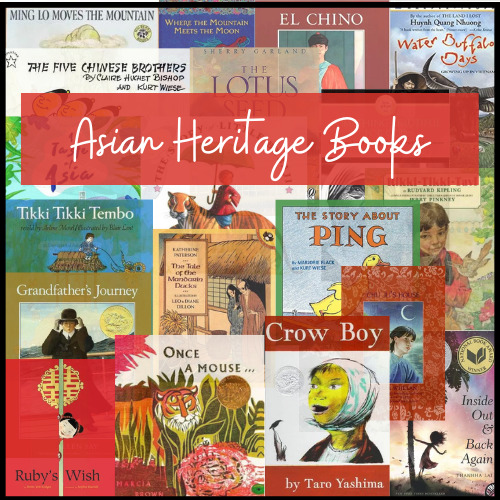
Asian immigration to Canada can be traced back to the mid-19th century when Chinese workers arrived on the west coast to work on the Canadian Pacific Railway. May is Asian Heritage Month in Canada and we’ve gathered a stack of books to help you and your family learn about the heritage of our Asian community. Use the links to find complete descriptions of each book. Anno’s China The Five Chinese Brothers Ruby’s Wish Water Buffalo Days Chu Ju’s House The Story About Ping Tikki Tikki Tembo The Tale of the Mandarin Ducks The Story of Little Babaji Where the Mountain Meets the Moon Inside Out and Back Again Rikki Tikki Tavi El Chino Ming Lo Moves the Mountain The Lotus Seed Something Beautiful for God Crow Boy Once A Mouse Grandfather’s Journey Taste of Asia by Adrianne Curwen Adrianne is a wife to a public-school educator/administrator and a homeschooling Mama to seven children, ranging in age from 7 to 23. She believes that we have a unique opportunity as homeschoolers to design individualized education that suits giftings, interests, and passions. She and her husband have used a blend of registered homeschooling, enrolment with independent DL schools, and participation in public trade school programs to design individualized programs for their children. She is passionate about using as many read-alouds, picture books, novels, and conversations to educate her children but also gets excited by the amazing homeschool-designed curriculum that’s out there. Adrianne is thrilled by her new role as Communication Specialist for Classical Education Books and is grateful to have an opportunity to learn something new. She is grateful, every day, for her saviour, Jesus Christ, and has no greater joy than when she sees her most important missions field walk with Him.
Apologia Exploring Creation with Marine Biology

Apologia is a Christ-centered, award-winning homeschool curriculum. Their mission is to help homeschoolers learn, live, and defend their faith through their curriculum. Overview Exploring Creation with Marine Biology is a high school level, college-prep, lab science (Biology is a prerequisite) yet it is also captivating to teens that are not majoring in science. The course covers a complex topic using a conversational style that is engaging for students. Parents will appreciate that it can be completely student-led. Apologia offers several ‘add-on’ components to the course, including a DVD, tests, and solutions, and a student notebook to complement the textbook. We used the text, test booklet, and the notebook, which we found indispensable. It offers a daily schedule which was easy to follow and includes a chart for grades. There are pages for notes, definitions, study guide questions, an experiment and lab report section, and space for the ‘On Your Own’ questions found throughout the text. The test manual includes solutions for the study guides, a test and solutions for each module, and quarterly tests. The course contains 16 modules, intended to be completed in 34 weeks using the lesson plan schedule of 45 minutes per day, 5 days a week. One module with lab experiments and tests should be completed every 2 weeks. *Our daughter found this pace quite relaxed and often would complete 2 lessons in 1 day. After completing the study guide for a module, she would start the next module, while studying for the test of the previous module. She completed the course in approximately 28 weeks. The Pros and Cons Pros included the easy-to-read delivery and the abundance of information on fascinating sea creatures. She also appreciated that while the focus of the course is on creationism, other viewpoints were presented as well for a balanced view of both sides. Cons were the large amount of time spent on microscopic creatures (not her personal favorite topic) and she found that often the study guide was not an accurate representation of the test questions. Final Thoughts While not considering herself a science kind of kid, our daughter really dove into this course (water, get it?…) We often heard her narrating fascinating tidbits at the dinner table, showing that she absorbed a lot of detailed information without the course being overly time-consuming. The ‘On Your Own’ questions were a great way to explore new knowledge on a deeper level, instead of just repeating learned facts and she liked that the author wrote for a high school audience in a way that was not overwhelming but was also not condescending. After going through all of the elementary Apologia science courses as well as several high school courses, we are excited to continue exploring creation! Other Apologia Titles for Highschool Science: Exploring Creation with General Science Exploring Creation with Biology Exploring Creation with Physical Science Exploring Creation with Chemistry Exploring Creation with Physics Exploring Creation with Advanced Biology Exploring Creation with Advanced Physics Julia lives in Langley, BC with her husband and four children. Their adventures include traveling as The Springmans, a family band. Yes, that means that Julia homeschools on the road! This last year has made them available online for everyone to enjoy. Visit their Facebook page for live concerts, and follow Ryan, Sarah and Jacob as they search for treasure in the wilds.
Teach Through April Book Stack
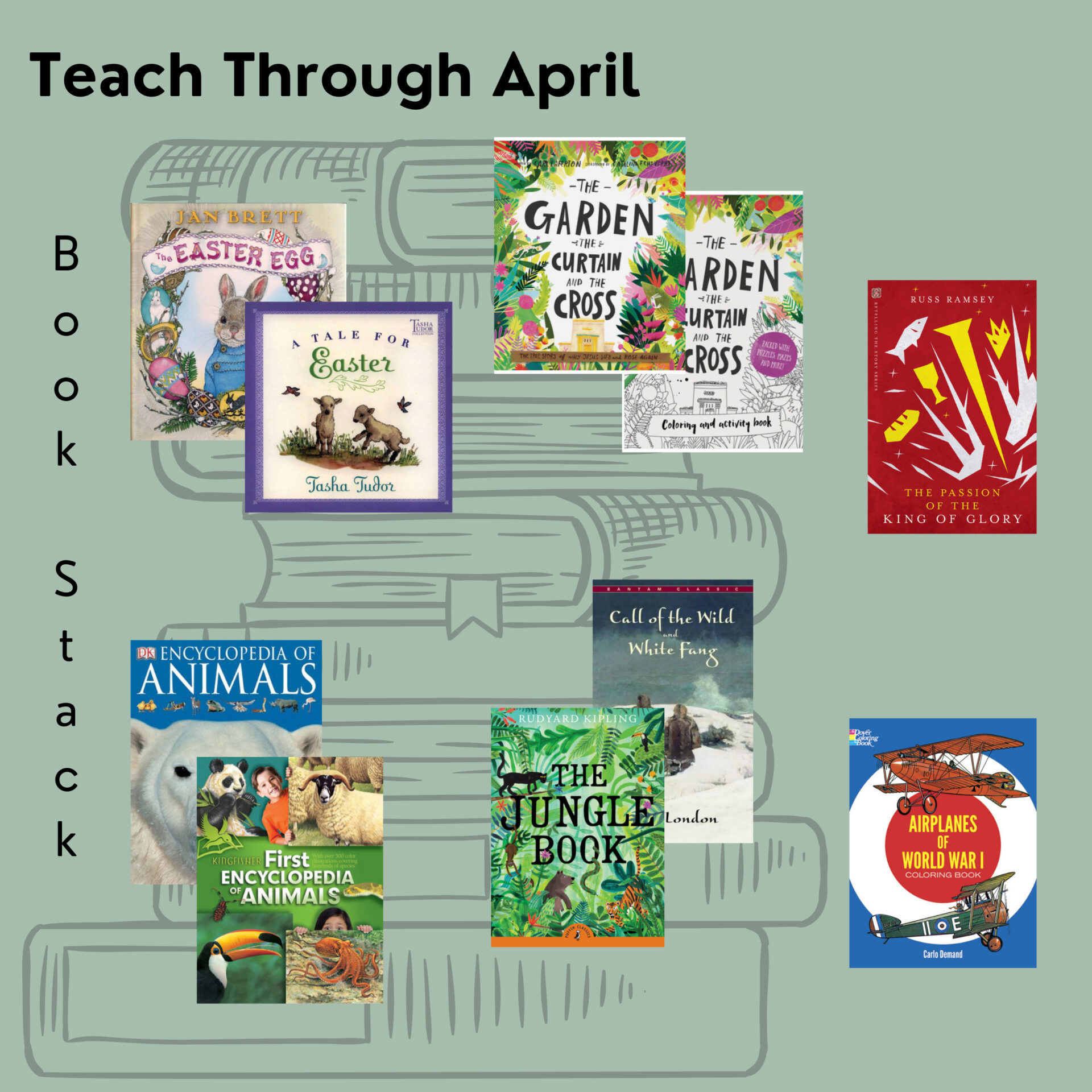
Easter Weekend – April 2nd-4th The Easter Egg A Tale for Easter The Garden, the Curtain, and the Cross The Garden, the Curtain, and the Cross – Coloring and Activity Book The Passion of the King of Glory National Wildlife Week – April 4th-10th Encyclopedia of Animals Kingfisher First Encyclopedia of Animals Call of the Wild and White Fang The Jungle Book Vimy Ridge Day – World War I – April 9th Airplanes of World War I – Coloring Book
Book Stacks – Katie Books
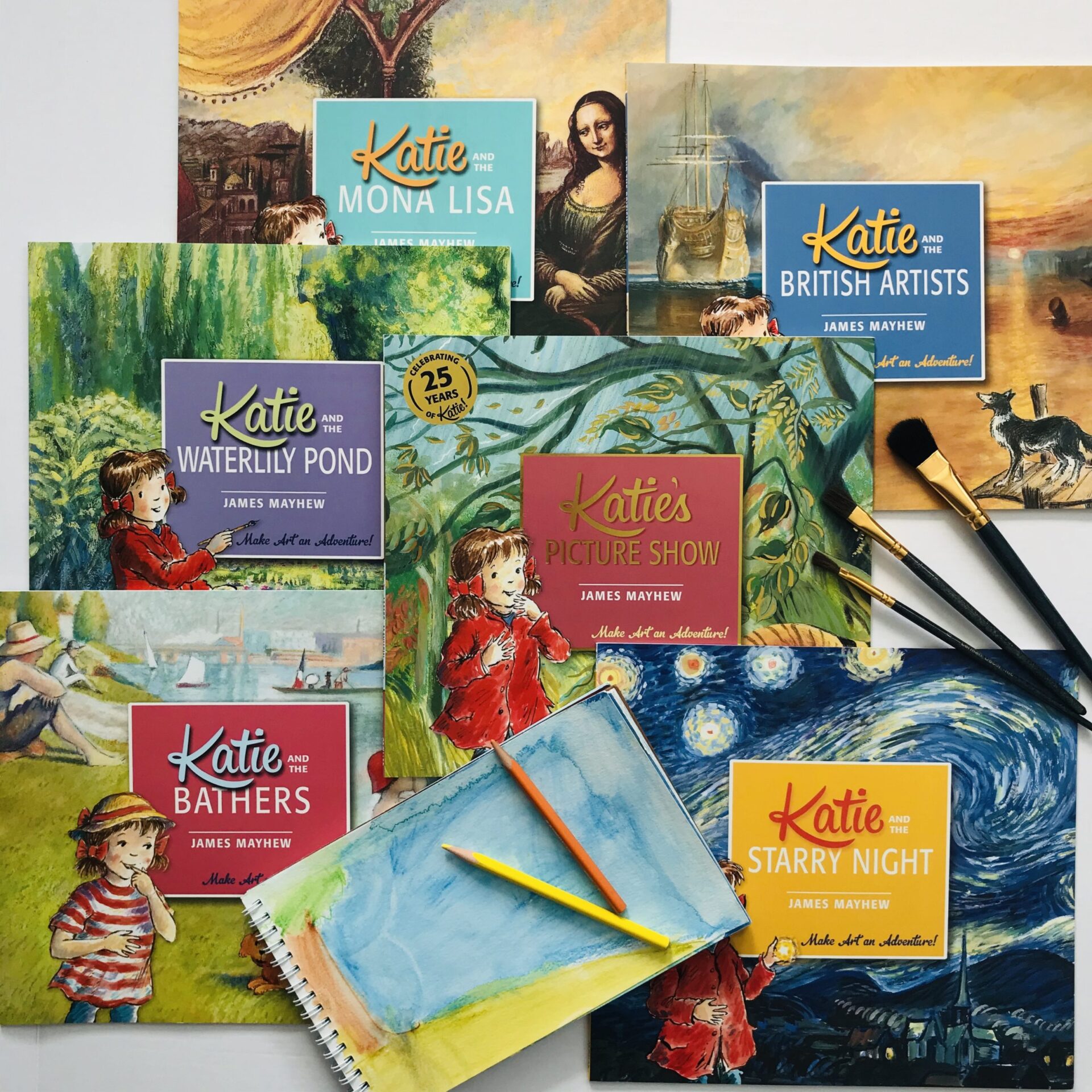
Subjects that are seen as “extra-curricular” can be the first to slide when life gets busy and sadly, I am guilty of this. You don’t have to look very far to find research that will encourage you to make art a regular component of your homeschool life so I encourage you to think through how you will work it into your days. We have a selection of art curriculum that you can work through with your children but also consider taking the time to introduce your children to famous artists and their work. We have used several of these Katie books; they are a fun way to introduce your children to the art world. Add a package of watercolour pencils, paintbrushes, and a new watercolour art book and you have the ingredients for making beautiful homeschool memories. Katie and the Mona Lisa Katie and the British Artists Katie and the Waterlily Pond Katie’s Picture Show Katie and the Bathers Katie and the Starry Night by Adrianne Curwen Adrianne is a wife to a public-school educator/administrator and a homeschooling Mama to seven children, ranging in age from 7 to 23. She believes that we have a unique opportunity as homeschoolers to design individualized education that suits giftings, interests, and passions. She and her husband have used a blend of registered homeschooling, enrolment with independent DL schools, and participation in public trade school programs to design individualized programs for their children. She is passionate about using as many read-alouds, picture books, novels, and conversations to educate her children but also gets excited by the amazing homeschool-designed curriculum that’s out there. Adrianne is thrilled by her new role as Communication Specialist for Classical Education Books and is grateful to have an opportunity to learn something new. She is grateful, every day, for her saviour, Jesus Christ, and has no greater joy than when she sees her most important missions field walk with Him.
Bible Storybook Stack
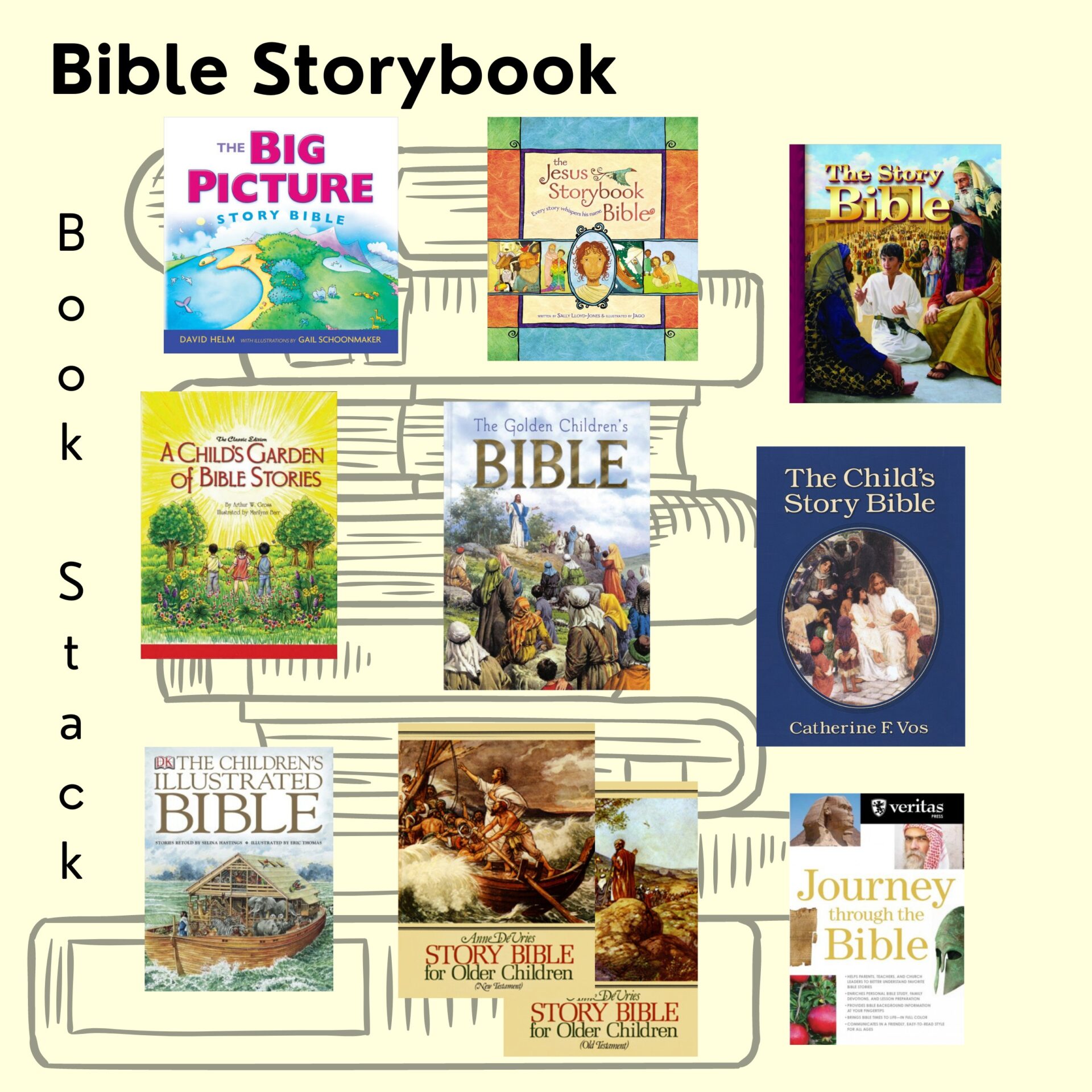
We have used several of these Bible Storybooks over the years and it would be a challenge to pick a favourite. It’s important that our children hear the bible read to them on a regular basis as hearing the words, wisdom, and instruction over the years builds a strong foundation. What at times seems to be information that is beyond young ones does build over time. A solid bible storybook is another tool we can use to build a solid foundation. They help young ones access wisdom and truth early in their lives and they give a high-altitude view of the bible, using stories as a way to communicate. As well, cycling through these stories year after year becomes the basis for more advanced learning, making these great resources for the grammar stage of learning. The Big Picture Story Bible The Jesus Storybook Bible The Story Bible A Child’s Garden of Bible Stories The Golden Children’s Bible The Child’s Story Bible The Children’s Illustrated Story Bible Story Bible for Older Children – Old Testament Story Bible for Older Children – New Testament Journey Through the Bible
Spring Book Stack

It’s March and I live in British Columbia so when I look out my window it’s spring. I have a favorite season but overall, I simply get excited about the changes that all the seasons bring. A new season naturally brings changes to weather, wardrobe, and activities but I like to purposefully exhaust as many changes as possible right down to the resources we use for our homeschooling: pumpkin picture books in October and Christmas books in December. Now is the time to scour your shelves for all things spring and we’ve compiled a stack of resources that would make great additions to your springtime learning. Coloring Books Don’t let the fact that these are coloring books fool you, they are full of more than just coloring. Your children will learn a lot as they read through these pages and be inspired to learn more. They are a great starting point for some springtime learning. Forest Animals My First Book About Backyard Nature Backyard Nature Coloring Book Picture Books You might still need a blanket but these picture books about nature would make great read alouds as you sit outside enjoying the change of season. I have to be so purposeful to get outside in the winter months but that all changes once springtime rolls around. We eat outside, read outside, and work through our morning time routine outside. Wangari Maathai Stellaluna The Gift of the Tree The Rainforest Grew All Around We’re Sailing to Galapagos Have You Seen Birds? Wonders of Nature Novels and Nature Stories All of the reading here has a spring/nature theme. Use the links below to see a full description of each title. The Penderwicks in Spring Come To My Tomorrowland The Burgess Bird Book for Children Outdoor Secrets Jack’s Insects We hope you are excited about the appearance of spring, but we also know that the events of life can cause the darkness of winter to take root where it is not welcome. Know that the CEB team is here to help you navigate through your homeschooling journey no matter what season you wake up to today. by Adrianne Curwen Adrianne is a wife to a public-school educator/administrator and a homeschooling Mama to seven children, ranging in age from 7 to 23. She believes that we have a unique opportunity as homeschoolers to design individualized education that suits giftings, interests, and passions. She and her husband have used a blend of registered homeschooling, enrolment with independent DL schools, and participation in public trade school programs to design individualized programs for their children. She is passionate about using as many read-alouds, picture books, novels, and conversations to educate her children but also gets excited by the amazing homeschool-designed curriculum that’s out there. Adrianne is thrilled by her new role as Communication Specialist for Classical Education Books and is grateful to have an opportunity to learn something new. She is grateful, every day, for her saviour, Jesus Christ, and has no greater joy than when she sees her most important missions field walk with Him.

